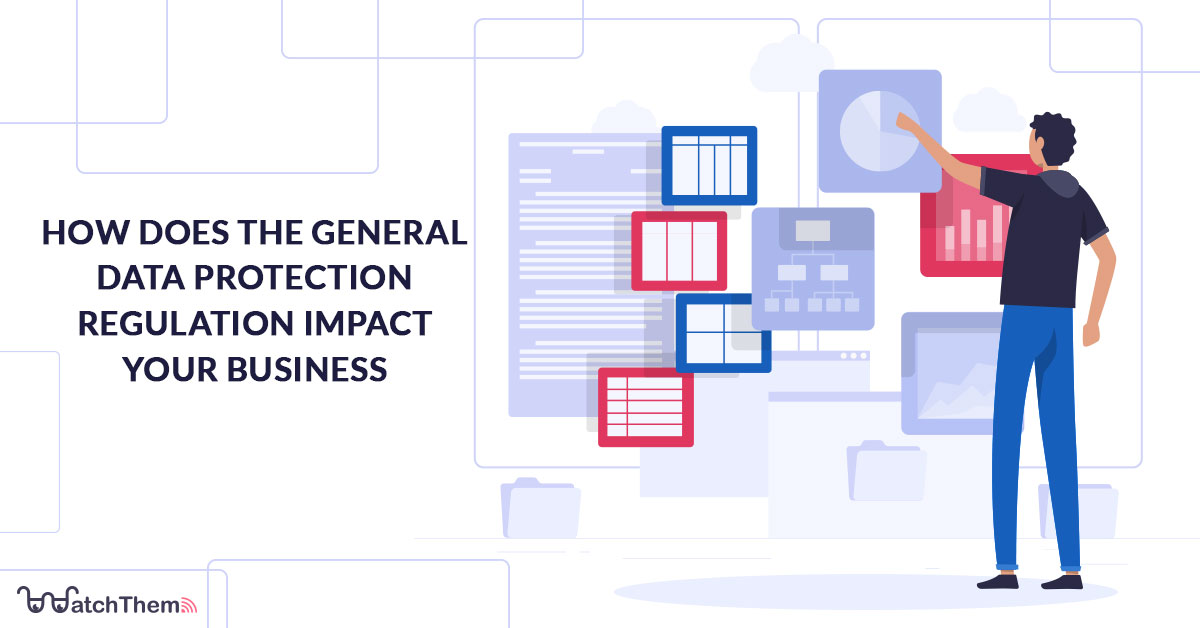Page Contents
Consumers love to control their data and see how their data is being used, where it is stored, and who is using their data. Nobody wants their data to be sold to a third party or for it to be stolen.
The GDPR is a set of regulations that European regulators have created. Even though it isn’t the only one to set privacy regulations across the globe, it still holds privacy violators accountable that operate within European borders.
We could go on all day and talk about the GDPR, but today, we will show you how much it impacts your business.
How is your business affected by the GDPR?
Here is how GDPR affects your business:
1- The Right to Be Forgotten
A massive achievement of the GDPR is how it implemented the regulation of allowing customers to control fully if their data should be kept within a company’s database or not. This means that even if we agree for our data to be stored, we might change our minds in the future. Above all, you as a company are obliged to inform your customers of how their data is being used and how you’ll process it.
Additionally, it doesn’t matter if the data is being processed in the EU or not; as long as it belongs to EU citizens, the GDPR plays a significant role in this case.
Note: Read more about GDPR
2- Customer Engagement
As individuals have the right to withdraw their data anytime, this means you have proof of the individual agreeing to a set of actions, for instance, agreeing to receive newsletters from you. However, you aren’t allowed to assume or add a disclaimer, so providing an “opt-out” option isn’t enough.
The GDPR has amended many of its regulations, including how you manage your marketing activities and more. Companies have to review business applications, forms, and processes to comply with double opt-in rules. For example, to sign up for communication, prospects will need to fill out a form that includes ticking a box and later confirming that it was them.
You have to prove that individuals have accepted to receive any emails or communication as an organization. All data held should have an audit trail, including when the data was stored and in-depth details of what the contact opted into and how they did so. Even if someone else, such as an outsourced partner or vendor, gathered the data, you should still be able to inform and provide the correct information.
3- Consequences for Not Complying
The GDPR only came out in early 2018, but it has obliged organizations to follow privacy policy rules since then. Failing to comply with the GDPR will only result in some scary fines. These fines can be anywhere from 4% of global annual revenue to millions of Euros!
To avoid paying these hefty fines and putting your business at risk, it’s best to partner up with a consultant or attorney who can continuously keep you updated and guide you through any difficulties you may have. An excellent place to start is to read about the law itself. However, if you just don’t have the patience to read for a long time, it’s best to consult with your attorney or consultant.
4- Security Measures Against Fraud
Cybercrimes are becoming even more common, with more users using the internet each year. According to statistics, cyber crimes are predicted to hit near $10.5 trillion in 2025. So, fraud is becoming a common thing in the digital world, and if you don’t take the proper security measures, you will still be held accountable for any fraud that occurs.
Even if data within your company gets stolen, the GDPR will still hold you accountable for the data stolen. That’s why you must always have a plan B and implement high-level security with your data.
Additionally, there are many types of fraud that can happen with data. A common type of fraud is affiliate fraud. This type of fraud includes hackers trying to steal your data through marketing activities, such as sending junk emails, bots, and manipulating you that you will receive a reward if you click on their links.
The best affiliate fraud protection method you can use is to not click on any links or reply to the emails being sent. Even though Gmail and Outlook will send most of these emails in the spam folder, keep an eye out. Only clicking on a link can cause you immense trouble.
5- Business Implications of the GDPR
The new data protection regulation puts consumers in the driver’s seat and allows them to control what is being done with their data entirely. Thus, enforcing organizations and businesses to comply with the rules.
The GDPR applies to all businesses and organizations that are established in the EU, and as we mentioned before, until the person is an EU citizen, the GDPR still has authority over you. So, in short, if your products and services are being sold to EU citizens, then it’s still subject to GDPR.
Organizations working with personal data should always appoint a person who ensures data comply with the GDPR or a data protection officer. After all, not everyone should have authorized access to sensitive data.
Moreover, it’s better to comply than to face significant fines. Here are a few examples of companies that failed to comply with the GDPR:
- British Airways: Paid a fine of more than 200 million Euros due to a data breach back in late 2018.
- Amazon: Paid a record fine of more than $888 million over data violations.
- Marriott International: Paid a more than $19 million fine due to a data breach.
Even though many companies may look at the GDPR as an issue, it’s not exactly the truth. The GDPR has influenced companies to change how they handle sales and marketing activities.
Moreover, the fines implicated by the GDPR are large enough. However, there are a few signs that they may become even larger in the near future. Therefore, companies need to ensure that they fully understand the GDPR and not only through their own interpretations.
Fundamental Rights of Individuals Under the GDPR
Individuals under the GDPR have the right to do the following:
- Data access: Individuals should be able to access their personal data and ask how their data is being used. The company has to provide a copy of their personal data, and even in an electronic format if requested.
- Right to be forgotten: If customers ask for their data to be deleted, you should delete their data immediately.
- Data portability: Consumers can transfer data from one service to another, and it must occur in a machine-readable format.
- Right to be informed: Individuals have to know how their data is gathered. Consumers have an opt-in option for their data to be collected.
- Information correction: Other than being informed, if customers see any errors in their data, they are allowed to report it as incomplete or incorrect.
- Data processing restriction: Individuals can request from companies to stop processing their data, and at the same time, their data can remain in place but not be used. Furthermore, companies have to immediately stop using data if they are using it for direct marketing. However, this needs to be made clear by individuals from the beginning and not later on.
- The right to be notified: If there’s any data breach, companies need to inform all users of what happened and that they’ll take security measures within that time frame. In addition, users should be notified within 72 hours after the breach has occurred.
The GDPR is the EU’s way of granting individuals, customers, contractors, and employees more power and control over their data and taking away the power of organizations who choose to use this data for monetary gains.
Conclusion
Well, that’s about it for this article. These were all on how much the GDPR impacts your business. Over the years, with the rise of cybercrime, data privacy regulators are becoming even more concerned about data and trying to grant more control to users.
After all, not all companies and organizations worldwide are legit, so don’t expect them to use this data legally. That’s why the GDPR has imposed restrictions and taken this power away from organizations. Nobody wants their data to be stolen or sold to third parties.
With every day passing by, it’s becoming increasingly important to ensure you comply with the GDPR. The fines aren’t easy to take, and if you get fined, it won’t be a small one! That’s why the best option is to follow the rules and even hire someone to help you if you have any difficulties doing so.





